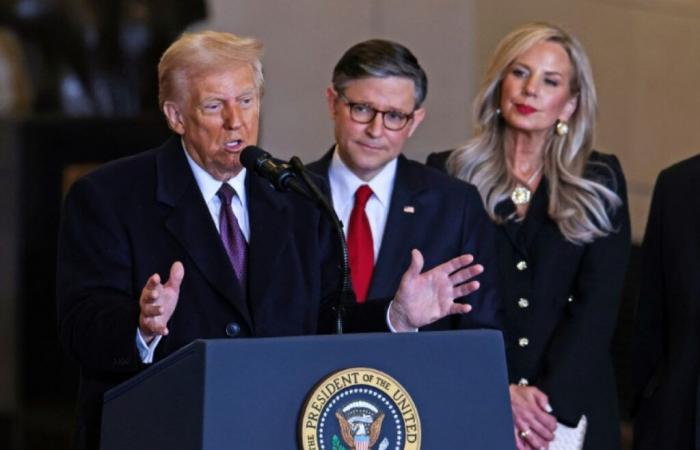The United States withdrawing from the Paris Agreement on climate change could create space for more ambitious countries to forge new alliances, observers say ( POOL / Graeme JENNINGS )
A hard blow for climate diplomacy, Donald Trump's promise to withdraw the United States from the Paris climate agreement for the second time highlights the countries that have so far been firmly committed to it, starting with China .
With almost the entire world still remaining a member (except a few countries including Iran, Libya and Yemen), the agreement adopted in 2015 in Paris will survive, believe diplomats and experts, who recall that for ten years, the collective commitments of countries around the world have improved predictions of future warming.
The agreement “is a pact that goes beyond the United States,” insists Frances Colon, of the Center for American Progress, a think tank close to American Democrats.
– Emerging players –
Brazil is one of the countries that wants to be leaders on the climate: in November it will host the largest annual UN climate negotiation conference, in the Amazon, COP30.
Its president, Luiz Inacio Lula da Silva, although in favor of the development of oil exploration, positions himself as the world's standard-bearer for the environment and, since he took office, deforestation in the Amazon has fallen.
Brazil also chairs BRICS, the bloc of major developing economies including China and India, which seeks to reshape the world order.
“This year could be a year of leadership for the Global South,” said Tim Sahay, co-director of the Net Zero Industrial Policy Lab at Johns Hopkins University.
India is also coming forward: its Prime Minister, Narendra Modi, praises his country's “leadership” in solar and wind power.
– China –
China declared itself “worried” on Tuesday about the United States' new exit from the Paris climate agreement. “Climate change is a common challenge facing all humanity, and no country can remain indifferent or solve the problem alone,” Foreign Ministry spokesperson Guo Jiakun said.
China will also strongly support climate multilateralism during Donald Trump's mandate, says Li Shuo, an expert on these negotiations at the Asia Society Policy Institute.
During the first American withdrawal, the Chinese remained attached to the Paris agreement and did not renounce their long-term objectives.
China now produces more than half of the world's electric vehicles, 70% of wind turbines and 80% of solar panels, which has made it possible to significantly reduce their costs, including for the countries to which it exports.
-As headwinds hamper global climate action, “China's performance in deploying green technologies could prove saving,” Li Shuo told AFP.
In the annual COPs, Beijing is a key negotiator, which informally directs negotiations with rich countries on behalf of a bloc of developing countries.
But without the United States, China, the leading country emitting greenhouse gases, could also be tempted to slow down its transition.
– Europe –
The European Union has a long tradition of climate leadership and has reduced its emissions by 7.5% between 2022 and 2023, far ahead of other large, rich countries. It is also the leading international donor in the fight against climate change.
During Donald Trump's first term, the EU and China launched a climate dialogue with Canada, pending the return of the Americans.
A similar effort will be needed in the turbulent times ahead, anticipates Alex Scott of the Italian climate think tank ECCO.
“The EU and China could work together to provide this geopolitical pillar,” she told AFP.
But the EU is grappling with significant budgetary difficulties and political shifts in favor of parties rather hostile to wind turbines or electric vehicles. While Beijing is in a trade conflict with Brussels over its carbon tax on imports.
– Colombia –
Other countries say they want to continue action despite headwinds.
In the United Kingdom, where Energy Minister Ed Miliband wants to “make a new leader on the climate”, electricity has never been as low carbon as in 2024.
Barbados and Kenya are spearheading global financial reform to help poorer countries.
Another example: Colombia pledged to stop extracting fossil fuels – its current main source of export revenue – and signed a global treaty to phase out oil, coal and gas.






